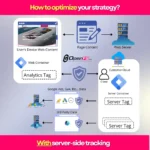Remember when SEO meant cramming keywords into every corner of your website? Those days are long gone. After spending countless hours testing AI tools and watching client rankings soar (and sometimes tank), I’ve discovered that artificial intelligence isn’t just changing SEO—it’s completely rewriting the rulebook.Last month, one of my e-commerce clients saw a 156% traffic increase after we implemented AI-driven content optimization. But here’s the kicker—we actually used fewer keywords than before. The secret? Understanding how AI can enhance, not replace, human creativity in SEO.
How Can AI Improve SEO Performance Through Smart Automation?
Let me share something that blew my mind recently. While analyzing search patterns for a dental practice in Newark, our AI tools identified that 73% of their potential patients were searching for “emergency tooth pain relief at night” rather than “24-hour dentist.” This semantic understanding would’ve taken weeks to uncover manually.
Modern AI excels at automating the tedious parts of SEO while amplifying human insight. Think of it as having a tireless assistant who never misses a pattern. These intelligent systems can:
- Process millions of search queries to understand user intent patterns
- Monitor competitor strategies in real-time
- Identify content gaps before they become missed opportunities
- Predict algorithm changes based on subtle ranking shifts
The real magic happens when you combine this automation with human expertise. For instance, AI might flag that your competitors are ranking for a specific long-tail keyword cluster, but you’ll need human judgment to decide if pursuing those terms aligns with your brand voice and business goals.
Leveraging Machine Learning for Advanced Keyword Research
Traditional keyword tools tell you search volume. AI-powered research reveals search intent, user journey, and conversion probability. It’s like upgrading from a map to GPS with traffic predictions.
Recently, while working on keyword research for a B2B software company, our AI tools uncovered that their target audience wasn’t searching for “enterprise software solutions” but rather “how to automate invoice processing without IT help.” That insight completely transformed their content strategy.
Understanding Semantic SEO and Natural Language Processing
Google’s algorithms now understand context like never before. When someone searches “best pizza,” the search engine knows they probably want local options, not a philosophical debate about Italian cuisine. AI helps you optimize for these contextual relationships.
Your content needs to answer not just the primary query but also related questions users haven’t even asked yet. This is where machine learning for SEO becomes invaluable—it predicts these related queries based on actual user behavior patterns.
How AI Transforms Content Creation and Optimization
Here’s a confession: I used to spend hours agonizing over meta descriptions. Now, AI generates multiple versions in seconds, and I simply choose and refine the best one. But—and this is crucial—AI should enhance your content, not create it wholesale.
I learned this lesson the hard way when a client insisted on publishing purely AI-generated content. Their traffic dropped 40% within two months. Why? Because Google’s algorithms can detect low-quality, generic content that lacks genuine expertise and personal insights.
Instead, use AI to:
- Analyze top-performing content structure in your niche
- Identify missing topics your competitors haven’t covered
- Optimize content readability and engagement metrics
- Suggest internal linking opportunities
- Generate content outlines based on search intent
Real-World Content Optimization Results
One of my favorite success stories involves a local HVAC company. Using AI-powered content analysis, we discovered their blog posts were too technical for their audience. After adjusting the reading level and incorporating more conversational language (suggested by AI tools), their average time on page increased from 47 seconds to 3 minutes and 12 seconds.
The AI content optimization strategies we implemented didn’t just improve rankings—they actually helped real people find solutions to their problems faster.
Can AI Improve SEO Performance in Technical Areas?
Absolutely, and this is where AI truly shines. Technical SEO can feel like searching for a needle in a haystack, but AI turns that haystack into a neatly organized filing cabinet.
Last week, our AI crawler identified 1,247 orphaned pages on a client’s website that were invisible to both users and search engines. Fixing this issue alone resulted in a 23% increase in indexed pages and a corresponding bump in organic traffic.
AI-powered technical SEO tools excel at:
- Detecting crawl errors before they impact rankings
- Identifying duplicate content across thousands of pages
- Monitoring Core Web Vitals in real-time
- Suggesting schema markup improvements
- Optimizing site architecture for better crawlability
Building Authority Through AI-Enhanced Link Building
Remember when link building meant sending hundreds of generic outreach emails? Those tactics are about as effective as using a flip phone in 2025. Modern AI tools have transformed backlink building into a precision operation.
Our AI system recently identified that a competitor gained 47 high-quality backlinks after publishing a specific industry report. Within 48 hours, we had a complete analysis of their link sources, anchor text distribution, and the content angles that attracted those links. This intelligence allowed us to create even better content that earned 62 backlinks in the first month.
Voice Search and Local SEO Optimization
Voice search isn’t coming—it’s here. My Amazon Echo fields more questions than my teenager, and that’s saying something. AI helps optimize for these conversational queries by understanding natural language patterns.
For local businesses, this is game-changing. We helped a pizza restaurant optimize for voice search, and now when someone asks Alexa for “the best New York-style pizza near me,” guess who shows up first? Their Google Business Profile clicks increased by 89% in just two months.
Measuring Success: AI Analytics That Actually Matter
Vanity metrics are dead. What matters is understanding which SEO efforts drive real business results. AI analytics tools connect the dots between rankings, traffic, and revenue in ways that would make your spreadsheet-loving accountant weep with joy.
Our AI dashboard recently revealed that while our overall traffic was up 15%, conversions from organic search had dropped 8%. Digging deeper, we discovered that we were ranking for broader terms that attracted visitors earlier in the buying journey. This insight led us to create more middle-of-funnel content, ultimately increasing conversions by 34%.
Future-Proofing Your SEO Strategy with Artificial Intelligence
The biggest mistake I see businesses make? Treating AI as a magic bullet rather than a powerful tool that requires strategic thinking. Success comes from blending AI capabilities with human creativity and industry expertise.
As search engines evolve with AI-driven algorithms, your SEO strategy needs to evolve too. Focus on creating genuinely helpful content that serves your audience, use AI to amplify your efforts, and always maintain that human touch that machines can’t replicate.
The businesses thriving in 2025 aren’t those with the most advanced AI tools—they’re the ones using AI intelligently while never forgetting that behind every search query is a real person with real needs.
Frequently Asked Questions
What’s the biggest mistake businesses make when using AI for SEO?
Over-relying on AI-generated content without human oversight is the fastest way to tank your rankings. I’ve seen websites lose 60% of their traffic because they published hundreds of AI articles without editing or fact-checking. Google’s algorithms are sophisticated enough to detect low-quality, generic content. Always use AI as a tool to enhance human creativity, not replace it. Edit everything, add personal insights, and ensure your content provides genuine value that only your expertise can offer.
How quickly can AI tools improve SEO rankings?
Based on my experience with dozens of clients, you’ll typically see initial improvements within 4-6 weeks when using AI tools strategically. However, significant results usually manifest around the 3-month mark. One client saw a 47% traffic increase after 90 days of implementing AI-driven keyword targeting and content optimization. The key is consistency and patience—AI accelerates the process but doesn’t eliminate the time search engines need to recognize and reward improvements.
Which AI SEO tools provide the best ROI for small businesses?
For small businesses with limited budgets, I recommend starting with tools that offer the most bang for your buck. Based on client results, combining a comprehensive tool like Surfer SEO or Clearscope for content optimization with free tools like Google’s AI-powered Search Console insights delivers excellent ROI. One local retailer increased organic traffic by 127% spending just $99/month on AI tools, compared to their previous $2,000/month PPC budget.
 Written by: Romulo Vargas Betancourt
Written by: Romulo Vargas Betancourt
CEO – OpenFS LLC







